Hamas attack from Gaza and the “total siege” of Gaza announced as an Israeli response: some notes from a public international law perspective
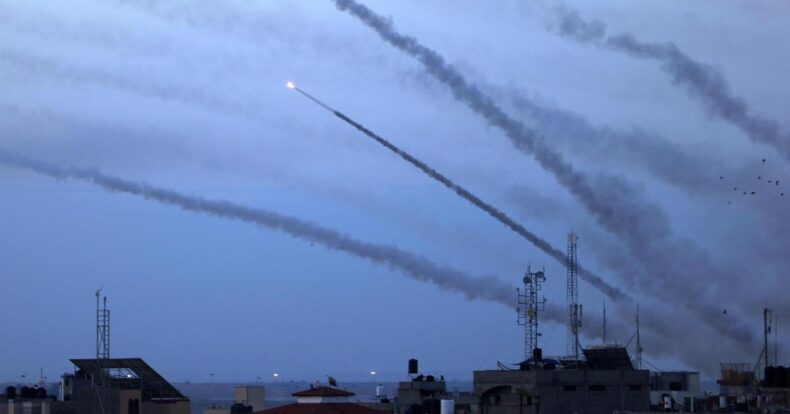
The Hamas attack from Gaza and the “total siege” of Gaza announced as an Israeli response: some notes from the perspective of public international law.
Introduction to the Gaza Conflict
Since the attack suffered by Israel on October 7, 2023, there have been many official statements from various States and international organizations expressing their deep solidarity with the Israeli victims and condemning the violence perpetrated by Hamas.
As an example, we can cite – among many others – the official communiqués issued by States such as Argentina: in this regard, it is a rather brief text if we compare it to the content of the communiqués of Bolivia, or Brazil, Colombia and Chile in Latin America.
In the case of Colombia, the full text of its communiqué reads as follows, which we thought it appropriate to reproduce in its entirety:
Bogotá, D.C., October 8, 2023 – The Government of Colombia reiterates the call to resume, as a matter of urgency, the dialogue between Israel and Palestine to initiate a peace process leading to peaceful coexistence, within mutually agreed and internationally recognized secure borders, with full support for the territorial integrity of the parties.
A glimpse of the current situation in the Gaza Strip
Recent events are an unequivocal demonstration that violence affects the majority of the population, with irreparable losses among children, women and men. The Israel-Palestine conflict must be resolved through dialogue and its solution must be supported in multilateral scenarios, in accordance with the numerous resolutions adopted by the United Nations, especially to implement the two-state solution as established by General Assembly resolution 181 (II) of 1947, and whose vision was ratified by the UN Security Council in subsequent resolutions.
Considerable readers will be able to compare Colombia’s communiqué with those of other States, which are much less extensive on what is happening in Palestine.
Similarly, we can refer to the texts drawn up by Germany, Japan, Malaysia, Morocco, Oman, Qatar or Sweden or those circulated by Switzerland, Thailand and Turkey ; also worth mentioning the position expressed this time by an international organization, the European Union (EU).
A rather lengthy communiqué prepared by the South Africa diplomatic apparatus began with the following words:
South Africa expresses its grave concern over the recent devastating escalation in the Israeli-Palestinian conflict. The new conflagration has arisen from the continued illegal occupation of Palestine land, continued settlement expansion, desecration of the Al Aqsa Mosque and Christian holy sites, and ongoing oppression of the Palestinian people. The region is in desperate need of a credible peace process that delivers on the calls of a plethora of previous UN resolutions for a two-state solution and a just and comprehensive peace between Israel and Palestine.
According to the vocabulary and the terms and adjectives used by the authorities of the State of origin, these and many other communiqués expressed, each in its own way, solidarity with the Israeli victims of what happened on October 7 in Israel: either in a long form, or in a short form, either with the idea of expressing briefly a situation or a context, or with the idea of limiting itself concisely to the event as such.
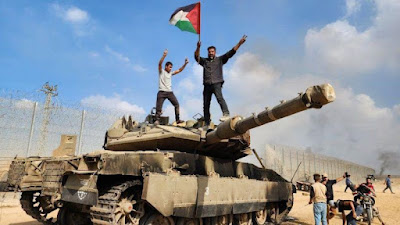
The Israeli response to international humanitarian law.
However, following Israel’s announcement of a total blockade on the Gaza Strip, populated with more than 2.2 million inhabitants, and subjected to intense Israeli aerial bombardment since the afternoon / evening of October 7, 2023, a few voices have been raised. While others, such as in Canada, have lent themselves to semantic exercises that have proved awkward (see note from LaPresse / Canada and this another from Radio Canada).
Concerning semantic aspects, the efforts of Israel’s highest authorities to associate the entire population of Gaza to Hamas, with even the following words used by its Defense Minister in a tweet on October 9, are of “emphasis” (to be read with double quotation marks please…):
I have ordered a complete siege on the Gaza Strip. There will be no electricity, no food, no fuel, everything is closed. We are fighting human animals and we act accordingly.
The dehumanization of a civilian population such as that of Gaza must also be understood as an effort to make future deaths and injuries much more easily accepted by public opinion. Meanwhile, since October 7, the unison is notorious on the part of the Israeli authorities to take advantage of every official statement they make to associate Hamas with the Islamic State.
Conflict Roots
Besides these and other semantic elements that are reproduced when the official discourse of the Israeli authorities is analyzed in detail, it is worth noting the very clear position expressed by the United Nations High Commissioner for Human Rights, which reported in a press release issued last October 10 (see full text), that:
On 9 October, the Israeli authorities ordered a “full siege” of Gaza, shutting off electricity, water, food and fuel supplies. This risks seriously compounding the already dire human rights and humanitarian situation in Gaza, including the capacity of medical facilities to operate, especially in light of increasing numbers of injured. The imposition of sieges that endanger the lives of civilians by depriving them of goods essential for their survival is prohibited under international humanitarian law, the High Commissioner said. Any restrictions on the movement of people and goods to implement a siege must be justified by military necessity or may otherwise amount to collective punishment.
Last October 12, it was the NGO Amnesty International that vehemently condemned the “total siege” of Gaza in a communiquéwhose full reading is recommended.
Even from the Israeli society itself, this joint communiqué of October 12 also calls for an immediate cessation of bombing in Gaza and illustrates the repudiation that, in some circles, is causing the reaction of its highest authorities.
The United Nations Special Rapporteur on the situation in the Palestinian territories did not hesitate last October 14 (see communiqué) to warn the international community that:
There is a grave danger that what we are witnessing may be a repeat of the 1948 Nakba, and the 1967 Naksa, yet on a larger scale. The international community must do everything to stop this from happening again,” the UN expert said. She noted that Israeli public officials have openly advocated for another Nakba, the term for the events of 1947-1949 when over 750,000 Palestinians were expelled from their homes and lands during the hostilities that led to the establishment of the State of Israel. The Naksa, which led to Israel’s occupation of the West Bank and the Gaza Strip in 1967, displaced 350,000 Palestinians“.
From some details overlooked in some circles.
Notice that in less than 24 hours, Israel bombed with its planes three times the only point that allows an exit from Gaza for a Palestinian civilian population fleeing aerial bombardments, the Rafah border crossing with Egypt (see note from press reporting an AFP cable of 7/10/2023).
Also, it is worth noting that three journalists were victims of Israeli shelling in Gaza in just 48 hours (see note from the Indian media, Siasat Daily and this other note from 20.minutes /France). A more recent note from a Turkish news agency refers this time to 8 journalists, of whom two are not known (see note).
This communiqué, speaks no longer of 8 but of 10 journalists who lost their lives. An incident has also been recorded in Tel Aviv with a team of BBC journalists (see note of 10/13/2023 from the same BBC). Regarding the press, it should be clear that, in a recent report presented in June 2023 (see link to report A/HRC/53/22 dated May 9, 2023) by a commission of inquiry on what is happening in Palestine – created by the United Nations Human Rights Council in 2021- , it is read that:
72. Palestinian journalists are particularly targeted and frequently subjected to harassment, attacks, arrests, detentions, imprisonment and accusations of incitement to violence, apparently as part of an effort to dissuade them from continuing their work. All of this is making Palestinian journalists increasingly fearful and self-censored. Israeli journalists are also increasingly under surveillance and subject to attacks, and are self-censoring for fear of harassment and loss of employment. The Commission reminds all duty bearers of their obligation to respect, protect and fulfill journalists’ rights to safety and freedom.”
Importance of an international law approach
On its side, it reads that for officials another United Nations agency, the World Health Organization (WHO), Israeli bombardments are dramatically affecting the already weak existing health infrastructure in Gaza, reading in this article from The Guardian that:
The World Health Organization said there had been 11 attacks on healthcare sites – which included medical facilities, ambulances and care providers – in the first 36 hours of the new conflict in Gaza.“There is an urgent need to establish a humanitarian corridor for unimpeded, life-saving patient referrals and movement of humanitarian personnel and essential health supplies,” the WHO said.
On October 12, the renowned NGO Human Rights Watch denounced Israel’s use of white phosphorus both in Gaza and in recent military actions in Lebanon (see report), which reads that:
The use of white phosphorus in Gaza, one of the most densely populated areas in the world, magnifies the risk to civilians and violates the international humanitarian law prohibition on putting civilians at unnecessary risk.
As can be seen, the Israeli military reaction seems not to be limited only to the objective of destroying the Hamas infrastructure, material and command centers located in Gaza and the physical elimination of its main leaders.
Chilling provisional balances on the rise
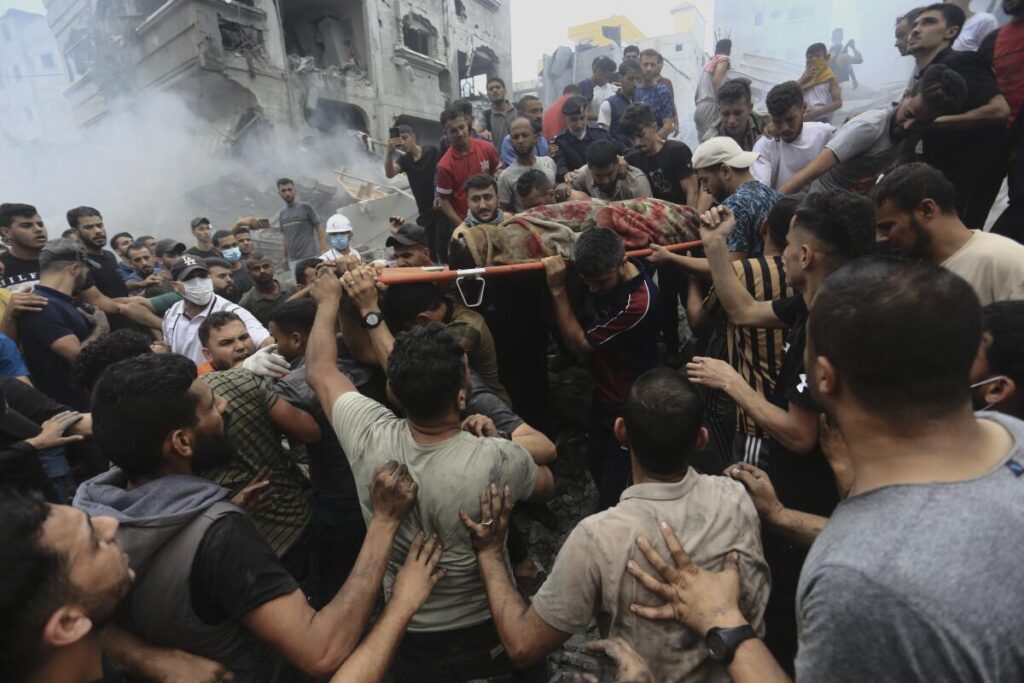
It should be clear that many of the seriously wounded Palestinians in Gaza who are being transferred to hospitals with no energy flow, no water, and no medicine are condemned to certain death, as the International Committee of the Red Cross (ICRC) itself warned last October 12 (see communiqué).
This very comprehensive article from The Guardian of October 13 states, with respect to an evacuation order given by Israel to 1.1 million Gazans, that:
Clive Baldwin, a senior legal adviser at Human Rights Watch, said Israel’s warning was simply not effective and called on world leaders to speak up. “The roads are rubble, fuel is scarce, and the main hospital is in the evacuation zone,” he said.
The latest count orsituation status as of October 21, 2023 prepared by the United Nations Office for the Coordination of Humanitarian Affairs (OCHA, see link official) indicates the following balance since the count of people killed and injured began on October 7 in Israel and Gaza:
– on the Palestinian side, 4385 people are reported killed and 13,561 injured in Gaza, to which must be added – in the West Bank – 84 killed and 1653 injured; while
– on the Israeli side, 1400 people are reported killed and 4932 injured.
About 48 hours earlier, the same state of affairs as of October 19, 2023 indicated the following balance:
– on the Palestinian side, 3785 people were reported killed and 12500 injured in Gaza, to which should be added – in the West Bank – 79 killed and 1434 injured; while
– on the Israeli side, 1400 people were reported killed and 4629 injured.
In order to get an idea of how these records are evolving, it should be noted that 48 hours ago, this same situation as of October 17, 2023 showed the following balance:
– on the Palestinian side, 3000 people were killed and 12500 injured in Gaza, to which must be added – in the West Bank – 61 killed and 1230 injured; while
– on the Israeli side, 1300 people were killed and 4229 injured.
In order to follow the timeline, the same situation status one day earlier, on October 16, 2023 indicated for its part the following balance:
– on the Palestinian side, 2808 people were killed and 10850 wounded in Gaza; while
– on the Israeli side, 1300 people were killed and 4121 wounded.
Compared to the situation 48 hours earlier, the situation status as of October 14, 2023 indicated the following balance:
– on the Palestinian side, 2228 people were killed and 8744 wounded in Gaza; while
– on the Israeli side, 1300 people were killed and 3621 wounded.
For its part, the same situation status as of October 12, 2023 indicated the following balance:
– on the Palestinian side, in Gaza, 1417 persons killed and 6268 persons wounded; while
– on the Israeli side, 1300 persons killed and 3391 wounded.
In order to compare the evolution of these data over time, the same situation status as of October 11, 2023 indicated the following balance:
– on the Palestinian side, in Gaza, 1100 people killed and 5339 people wounded, while;
– on the Israeli side, 1200 people killed and 3192 wounded were recorded.
It is very striking to note that in the situation report as of October 9, 2023, the balance recorded was as follows:
– on the Palestinian side, in Gaza, 687 people were killed and 3800 injured, while on the Israeli side, 900 people were killed and 2616 injured.
As can be seen, day after day, report after report, the numbers of fatalities and injuries from Gaza are soaring, with more than 3600 people losing their lives between October 9 and October 21, 2023 alone.
The NGO Defense for Children, Palestinian section, refersto more than 1000 children who have already died since the beginning of the Israeli offensive in Gaza (see communiqué entitled “One Palestinian child in Gaza killed every 15 minutes by Israeli forces“).
The option of the “total siege” of Gaza, of the disproportionate and indiscriminate military response in the face of public international law.
We can read in a recent interview (whose complete reading we recommend) with a Belgian specialist in public international law who knows the situation in the occupied Palestinian territories very well, that:
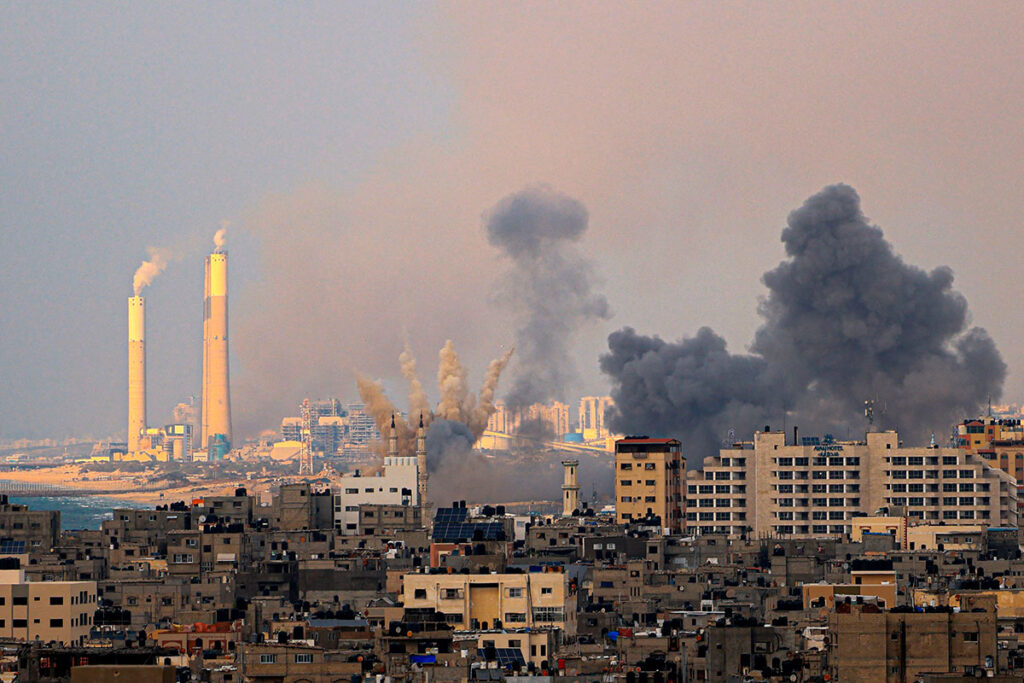
Quand on coupe l’eau et l’électricité, ainsi que l’approvisionnement en nourriture et en essence, ce qui s’ajoute au blocus militaire qui s’appliquait déjà depuis des années, on peut très rapidement aboutir à des effets délétères, qui contreviennent au droit humanitaire et aux droits humains.
The Spanish Association for the Application of International Human Rights Law (AEDIDH) has made a similar pronouncement in a communiqué which we recommend reading, recalling that the previous military offensive in Gaza in 2014 by Israel is already of interest to international criminal law. Meanwhile, we thank our esteemed readers for sending us similar pronouncements coming either from associations of professors of international law, or from similar human rights entities, quite cautious and cautious despite the dramatic images of what is happening to the Palestinian civilian population in Gaza since the evening / night of October 7.
On this last aspect – a specific branch of public international law such as international criminal law – we had the opportunity to analyze a decision of February 4, 2021 of a Pre-Trial Chamber of the International Criminal Court (ICC) authorizing the Office of the Prosecutor to carry out investigations in all Palestinian territories, without exception of any kind (a decision, as expected, little publicized in some international media): see in this regard our note entitled “International Criminal Court (ICC)/Palestine: the end of impunity for perpetrators of war crimes committed in Palestine?“.
Current Israeli authorities: victims of their own illusion?? illusion?.
Israel’s decision to officially “avenge” all the Israelis killed in the attack perpetrated by Hamas on October 7 from Gaza (see note from Le Point – France) seems to be part of a very particular logic of the current Israeli authorities, who seem to have been taken by surprise.
An editorial in the Israeli newspaper Haaretz (seetext) read an opinion piece entitled “Netanyahu’recklessness has brought war upon Israel” while this note from the BBC details the observed failures on the part of the intelligence and surveillance services in Israel.
Given that this is the first major coordinated attack on Israel’s own territory since its creation in 1948 by Hamas, doubts of various kinds have surfaced, making it clear that what has happened is also the result of Israel’s erratic policy in recent times.
The images of Hamas motorized paragliders landing without much trouble near a crowd dancing and listening to a music concert (see video) just a few kilometers from the Gaza Strip are more than eloquent.
The Humanitarian Impact
Apparently, a large part of Israel’s military troops usually guarding the Gaza Strip’s environs were sent to the West Bank to guard groups of Israeli settlers and protect them from the reactions of Palestinian families dispossessed of their land. Even more striking, intelligence reports coming out of Egypt and warning of a possible attack of some size – “something big” as it was reported – were not taken into account by the Israeli authorities themselves (see note from the Times of Israel media outlet).
As an example among the voices highly critical of the current Israeli authorities, the former Israeli ambassador to France, Elie Barnavi, entitled a column – see text – in Le Monde (France) bearing the following name: ” L’attaque du Hamas résulte de la conjonction d’une organisation islamiste fanatique et d’une politique israélienne imbécile“.
Needless to say, the Israeli NGO B’Tselem issued a communiqué on October 10, warning of the very likely commission of war crimes by the Israeli army in the planned “revenge” announced by its highest authorities (see communiqué), stating that:
One crime does not justify another, nor does one kind of injustice justify another. Acts of revenge are prohibited by basic moral principles and by the provisions of international law that Israel is obliged to uphold.
Hamas Attack and the Gaza Siege
At this point, it should be recalled that the illegal Israeli colonization in the West Bank led the United Nations Security Council, on February 20, 2023, to express itself through a Presidential Statement in the following terms (see full text):
The Security Council reaffirms its unwavering commitment to the vision of the two-State solution where two democratic States, Israel and Palestine, live side by side in peace within secure and recognized borders, consistent with international law and relevant UN resolutions. While, the United Nations expresses deep concern and dismay with Israel’s announcement on February 12, 2023, announcing further construction and expansion of settlements and the “legalization” of settlement outposts. The International Community reiterates that continuing Israeli settlement activities are dangerously imperiling the viability of the two-State solution based on the 1967 lines.“.
Photo of the Palestine solidarity day held on October 15, 2023 in front of the Legislative Assembly of Costa Rica, extracted from social network of the Palestine/Costa Rica Solidarity Network.
On October 18, in the United Nations Security Council, the United States voted against a draft resolution submitted by Brazil, which had 12 votes in favor and two abstentions (Russia and the United Kingdom): further evidence of the profound isolation in which the United States feels obliged to place itself before the rest of the international community every time it tries to condemn Israel for its military actions (see UN press release). A recent report submitted to the UN General Assembly by the International Independent Commission set up in 2021 (see report A/78/198 of September 5, 2023) warned of the explosive situation in Palestine (see in particular conclusions, at paragraphs 65-77).
The immutable rules of international humanitarian law.
From the perspective of public international law, any State under attack has the right to defend itself.
However, the same State is also under an obligation to respect the existing rules of international humanitarian law when taking military action in response to an attack. These rules apply in particular when planning military operations,
– to clearly discriminate the civilian population from military targets, as well as to clearly discriminate the civilian population from military targets, as well as to clearly discriminate the civilian population from military targets;
– to respond in a way that is proportional.
These two rules apply both to the military of a state and to an armed group such as Hamas, as they are common knowledge to all military commanders who receive any kind of training.
So, despite repeated military actions by Russia directly and intentionally affecting the Ukrainian civilian population (since Russia proceeded with military aggression against Ukraine in February 2022), the Ukrainian military has attempted to maintain in its military operations a clear discrimination between military targets and the Russian civilian population.
A strange sensation of “déjà vu”.
Returning to the troubled Gaza Strip, it should be recalled that in the past, military offensives in Gaza officially carried out by Israel to also “eliminate Hamas terrorists” have resulted in dramatic deadly casualties for the Palestinian civilian population, also very little reported in some international media:
– in 2014, following the military offensive in Gaza (70 dead on the Israeli side, including 67 soldiers killed during the ground offensive), 2 251 people were recorded dead on the Palestinian side, including 551 children (see link for the United Nations report and its summary). We invite our esteemed readers to review the figures and establish a macabre “ratio” of Palestinian casualties for every life lost by Israel.
– in 2009, the military offensive carried out in Gaza between December 28, 2008 and January 17, 2009 by Israel (see link), resulted in the deaths of 13 Israelis and the deaths of approximately 1,400 Palestinians (see “casualties” section at paragraphs 352-364 of this UN report). Here again, the same invitation to the reader is made in relation to the aforementioned “ratio“.
Annex II (page 434 onwards) of the quoted report on the 2009 military operation includes the sustained correspondence with Israel in the face of its persistent refusal to cooperate with the members of the UN commission of inquiry.
aaaaaaaaaa
As a point of interest, a recent report on the damage caused in Gaza during the only Israeli military offensive in 2014, prepared by UNDP, estimates the amount to be over US$ 1.7 billion, stating that:
“According to this preliminary assessment, the value of damages resulted by this war are estimated to reach up to $1,727,027,316″ (véase informe, p. 26).
Probably, the Israeli military response, which, these days, consists of “avenging” the victims of last October 7, will once again condemn a large part of the Palestinian civilian population in Gaza to suffering and pain, due to military operations carried out by Israel in an indiscriminate and disproportionate manner.
One specific point should be of much greater interest to the media: the deaths of Palestinian journalists and reporters in Gaza, photographers and cameramen, to the extent that it may be in Israel’s interest that the extent of its bombing in Gaza not be accurately documented and reported.
As has been the case in the past, these Israeli retaliatory actions will be closely observed by several UN bodies as well as by some of its specialized institutions. Should it again be so deadly and harmful to the Palestinian civilian population in Gaza – as has been observed on previous occasions – the International Criminal Court (ICC) could also initiate a new investigation into the matter, including both exactions committed by Hamas and by Israeli security forces in Gaza.
adb
Last October 10, 2023, the aforementioned international commission of inquiry – created within the Human Rights Council since 2021 (see link) – announced that it was starting to gather information on what happened since October 7 (see its official statement).
Finally, it is interesting to review the conclusions reached in the past by specialists in public international law in relation to Israel’s military offensives in Gaza. For example, among many others, it is noted in this article published by the University of Denver (Colorado) in the United States, regarding the deadly 2009 Gaza offensive, that:
” Israel’s capacity to trample international humanitarian law in its current state is a function of two factors: its overwhelming military superiority as against any combination of its neighbors; and the cocoon of impunity in which it has been enwrapped-largely due to the diplomatic cover provided it by the United States.The United States government has exercised its veto power in the United Nations Security Council forty-two times-over half the vetoes it has employed since the birth of the United Nations-to spare Israel censure for its actions. In the recent fighting in Gaza, a Security Council resolution for a ceasefire was delayed in part out of concern over a probable U.S. veto, permitting Israel to extend its operation into several weeks”.
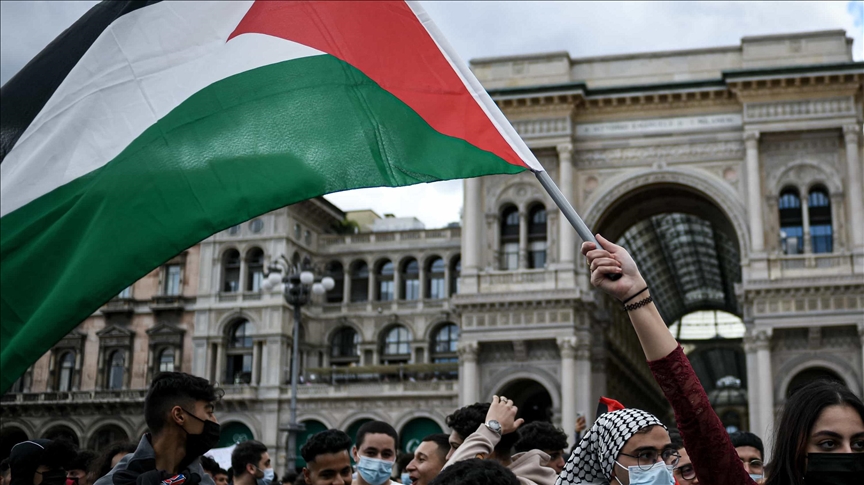
State demonstrations in solidarity with Israel do point to a line on the horizon.
Faced with the situation in Israel since October 7, the international community is seeking at all costs to avoid an escalation of violence. There have been many calls condemning the violence from various actors in international society.
Contrary to some States, which omitted to mention the future two-State solution in their respective communiqués – as is the case of the communiqués of France or Guatemala and Panama -, the communiqué prepared on October 7 by the diplomatic apparatus of Chile (seefull text) stated that:
“Chile considers it essential to relaunch, with the support of the international community, the process of direct negotiations in good faith between the two parties, leading to a just, full and final peace agreement. In this context, within the framework of the two-state solution, recognizing the right of Israel and Palestine to coexist in peace, within mutually agreed and internationally recognized secure borders, in accordance with the resolutions adopted by the United Nations”.
Perspectives for a Solution
Similarly, Brazil’s official statement highlighted that:
“Brazil regrets that in 2023, the year of the 30th anniversary of the Oslo Peace Accords, there will be a serious and growing deterioration in the security situation between Israel and Palestine.As President of the United Nations Security Council, Brazil will convene an emergency meeting of the body.The Brazilian government reiterates its commitment to the two-state solution, with Palestine and Israel living together in peace and security, within mutually agreed and internationally recognized borders. Another reaffirmation is that the mere management of the conflict does not constitute a viable alternative for dealing with the Israeli-Palestinian issue, and that the resumption of peace negotiations is urgent.”
Besides these first official appeals not to escalate the violence between Israel and Palestine, some states such as Egypt, Turkey, or Qatar (which provides Hamas with some US$ 30 million monthly), have offered to mediate regarding the fate of the more than 130 Israeli hostages still held by Hamas. For some analysts, these hostages may constitute a real “dilemma” for the current Israeli political decision-makers (see note from Le Courrier International / France): it should be noted that in this group of 130 hostages, there are nationals of more than 20 States as reported by some European media (see note from Libération / France).
It was read this October 16 that Colombia is threatening to suspend diplomatic relations with Israel and has demanded apologies from the Israeli Ambassador in Bogota for disrespectful remarks on his part towards its highest authority (see note from La Vanguardia).
Conclusion.
The decisions to be taken by the highest Israeli authorities should hopefully not repeat past actions, in clear violation of the most basic rules of international humanitarian law.
These disproportionate and indiscriminate military actions have only added to the sense of despair of many in Gaza (and beyond), thus providing an ever-fertile ground for radicalization of various sectors.
An overlooked fact by some analysts and commentators these days is that within Hamas there existed a more moderate wing that announced in May 2017 from Qatar the change of its statutes, incorporating the idea of a Palestine circumscribed only to the 1967 borders, as recognized by the international community (see press release from 2017 and this analysis conducted by the Observatory of International Politics of the University of Costa Rica – UCR). Despite the turn observed in 2017, the policy of Israeli settlements illegally colonizing Palestinian territory in the West Bank has constituted a real provocation, undermining any effort of rapprochement between Israel and Palestine, and contributing to the aforementioned radicalization.
Regarding this sustained Israeli colonization, it should be noted that since December 2022, a consultative procedure was formally initiated before the International Court of Justice (ICJ) on two questions related to Israel’s illegal colonization policy carried out in recent years in the West Bank, and promoted by its current authorities: we refer our readers to our note entitled “Latin America in the face of a request for an advisory opinion to international justice on the situation in Palestine: brief notes on the unusual vote against Costa Rica”.
Recapitulation of key issues and final considerations
Among the warlike chants of revenge heard in Israel, and the official announcement of an imminent large-scale ground intervention in Gaza by its authorities, and in the face of the attitude of some of Israel’s allies, a columnist in the United States did not hesitate to write in an influential medium such as the New York Times (see text, the full reading of which is recommended) that:
America cannot protect Israel in the long run from the very real threats it faces unless Israel has a government that reflects the best, not the worst, of its society, and unless that government is ready to try to forge compromises with the best, not the worst, of Palestinian society.
As the days go by, it is very likely that the aforementioned numbers of people killed and injured in Gaza are going to begin to impact public opinion around the globe, and in particular within some Arab states that have felt it was time to “normalize” their relations with Israel in years past. Saudi Arabia has just confirmed that it is suspending all discussions it had been far advanced with Israel on a possible normalization of their relations (see press release from France24).
Even as the shocking images of the drama to which Israel is subjecting the Palestinian civilian population in Gaza circulate, it is possible that the acts of repudiation of Israeli policy will tend to become even more radical throughout the world. From a simple strategic point of view, is this not the trap set by Hamas into which Israel seems to have fallen?
Posted by Curso de Derecho Internacional. Costa Rica
Nicolas Boeglin, Professor of International Public Law, School of Law, University of Costa Rica (UCR). Contact: [email protected]
Navigate articles







